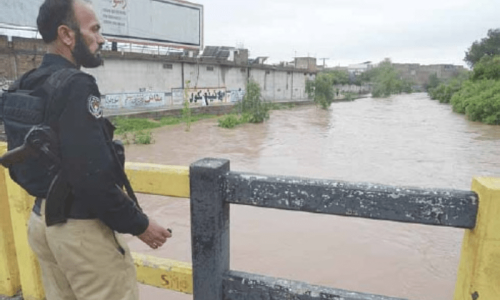PESHAWAR: Devolution of powers to the province after the passage of 18th Amendment has been hampering health programmes involving international commitments, agreements and conventions rectified by the federal government, according to sources.
Sources said that the amendment by National Assembly in 2010 was aimed at devolving all the departments to the provinces. “However, provinces are facing problems in pursuing the commitments and agreements signed with the international organisations,” they added.
The provinces lacked guidance about the UN and other international conventions, regarding HIV/Aids, tuberculosis, immunisation, mother and child health and malaria etc. “The federal government is to implement these in all population,” they said.
Health has become a provincial subject after passage of 18th Amendment
Sources said that before the devolution of powers, the provinces gave input to the federal government about new policies on control and treatment of disease and received guidance. “Now the role of centre has dwindled and the provinces don’t receive any assistance about these vital issues as well as emerging diseases and epidemics for which they need immediate assistance,” they added.
The Ministry of National Health Services Coordination and Regulations was established in 2012 in Islamabad to act as bridge among the provinces but its role has not been up to the desired level. Before it, the Ministry of Health, gave support, guidance and resources and technical assistance to provinces to meet global health goals, sources said.
They said that coordination among provinces was not good. “They face problems with regard to implementation of international commitments,” they added.
A few months ago, provinces demanded replication of Punjab Dengue Control Programme but didn’t get any response. “Khyber Pakhtunkhwa also wanted it,” said sources.
Prior to devolution of powers, the provinces managed health but received technical and financial assistance from centre with regard to some programmes, like lady health workers programme, HIV/Aids, polio, malaria and mother and child health because these programmes needed international guidelines and support. “After devolution, these programmes have suffered badly and provinces are finding it hard to cope with the situation,” said sources.
The provinces are also unable to carry out research in the area of medicines because in the past it was done by the centre, which carried out studies on diseases with the help of UN agencies and international donor organisations under the umbrella of the federal government.
Sources said that a dashboard was set up at federal level to coordinate among the provinces regarding global commitments of the country with United Nations and other donor organisations, funded mainly by countries of European Union.
“The provinces also don’t give much importance to NHSCR, more so because the latter isn’t able to assist the former like Ministry of health did before the passage of 18th Amendment. It has created gaps in interventions in provinces,” they said. Sources said that there were policy gaps, which had made it difficult for the provinces to enforce national policy to a desired level. They said that national policy remained compromised in absence of uniformed approach.
“There is lack of clarity in health policy. Health is totally a provincial subject but without centre’s involvement, international commitments couldn’t be pursued properly,” they added.
Published in Dawn December 6th, 2016














































Dear visitor, the comments section is undergoing an overhaul and will return soon.